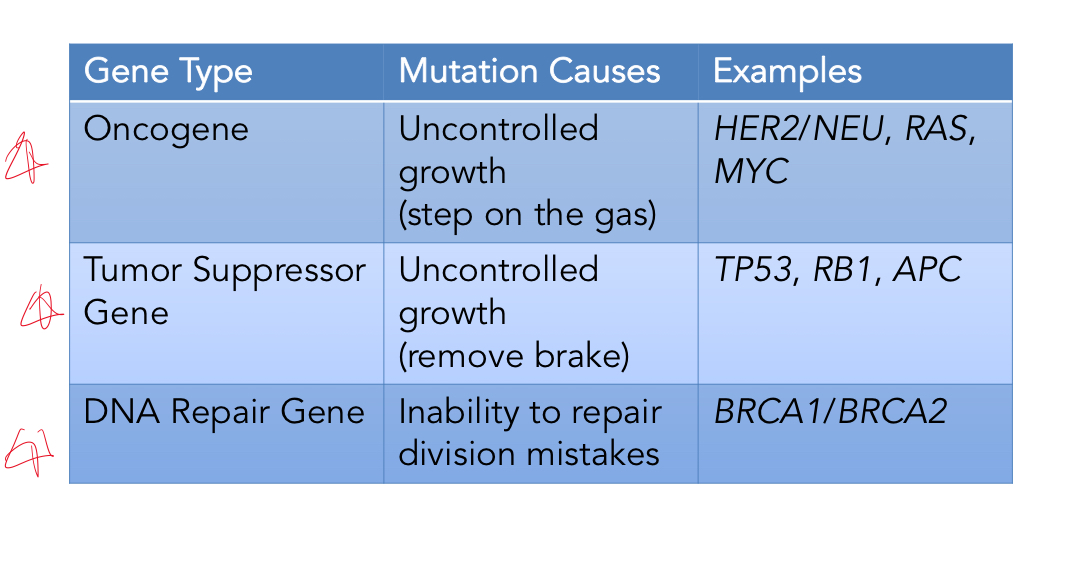Cancer genetics 1
1/64
There's no tags or description
Looks like no tags are added yet.
Name | Mastery | Learn | Test | Matching | Spaced | Call with Kai |
|---|
No analytics yet
Send a link to your students to track their progress
65 Terms
Can you inherit cancer?
No, except for one type of rlly rare umbilical cancer
How many Canadians develop cancer in lifetime?
1 in 2 Canadians
Males: 1 in 2.2
Females 1 in 2.3
How many Canadian will die of cancer?
1 in 4 Canadians will die of cancer
Males: 1 in 3.8
Females: 1 in 4.4
Why are males more susceptible to cancer?
Cuz of sex chromosomes, the prostate, and hormones
What’re the most common cancers men get?
Prostate = 20.3%
Lung = 13.2%
Colorectal = 12.9%
What’re the most common cancers women get?
Breast = 25%
Lung = 13.5%
Colorectal = 10.9%
What’re the cancers that cause the most deaths in men?
Lung = 25.2%
Colorectal = 12%
Prostate = 9.5%
What’re the cancers that cause the most female deaths?
Lung = 26.1%
Breast = 12.9%
Colorectal = 11.4%
What’re the 2 types of tumors/ malignancies?
Solid tumors/ malignancies
Liquid tumors/ malignancies
What’re the 2 types of cancerous solid tumors And where do they occur?
Carcinoma
Most common types of cancer
Arise from cells that cover external/ internal body surfaces (epithelial): lung, breast, colon
Sarcoma
Arise from cells found in supporting tissues: bone, cartilage fat, connective tissues and muscle
What’re the 2 types of cancers from liquid tumors and where do they occur?
Lymphomas
Arise in the lymph nodes and tissues of the body’s immune system
Leukaemias
Cancers of the immature blood cells that grow in the bone marrow
Whats the difference between solid and liquid tumors?
Solid: Genetically complex (many genetic alteration, more than liquid)
Liquid: Genetically simple ( Fewer genetic alterations, some have specific rearrangements)
Whats cancer?
Disease of the cell cycle
Cells that proliferate/ divides uncontrollably
What’re the 2 different genes involved in cancer and what do they do?
Tumor suppressor genes (brakes)
Oncogenes (accelerators)
Whats the cancer development benign to malignant pathway?
Hyperlasia → Dysplasia → Carcinoma
Whats hyperlasia?
1st step towards cancer
Enhanced tissue growth (NON CANCEROUS)
Larger than normal cell numbers
Cell structure is normal
Tissue structure is normal
Whats an example of hyperlasia?
Callous on hand: Not cancerous but repeated stress causes excess cell growth
Whats dysplasia?
Abnormal/ excessive cell growth (NON CANEROUS)
Loss of normal tissue arrangement
Loss of normal cell structure
Can become malignant (not cancerous but may need to be treated)
Whats an example of dysplasia?
Intestinal polyp: not cancerous/ pre cancerous but needs to be surgically removed cuz it can become cancerous
Whats happens from dysplasia to carcinoma?
Invasive malignancy (metastatic)
Invade through basal layer and become cancerous and can metastasize
Are all tumors cancerous?
NO
Whats the difference between benign vs malignant tumors?
Benign
Not cancerous
Abnormal cell growth (locally restricted)
Incapable of invasion or metastasis
Malignant
Cancerous
Can invade neighbouring tissues
Can enter blood vessels (metastasis)
Can metastasize to distant sites (other organs)
What’re the steps of growth and invasion?
Development of tumor/ neoplasm
Invasion of surrounding tissue
Metastasis = spreading to other organs
Why is staging a tumor important?
Cuz with it we can see how severe it is/ what parts of the body are affected by it
What’re the different stages of colorectal cancer?
Stage 0: high grade dysplasia
Stage 1: Invading through basal membrane
Stage 2: Invading deeper
Stage 3: In colon cancer involves lymph nodes
Stage 4: Metastasis to other organs (usually liver for colorectal cancer)
Why is cancer potentially dangerous?
Can impair normal tissue/ organ function such as the brain and liver depending on location and size
Malignant tumors can metastasize which disrupts normal function
>80% of deaths attributed to metastases
How long does it take to go from benign to malignant?
10-20 years on average
Whatre the 10 hallmarks/ enabling features of cancer
The ones in green are what we discuss in class
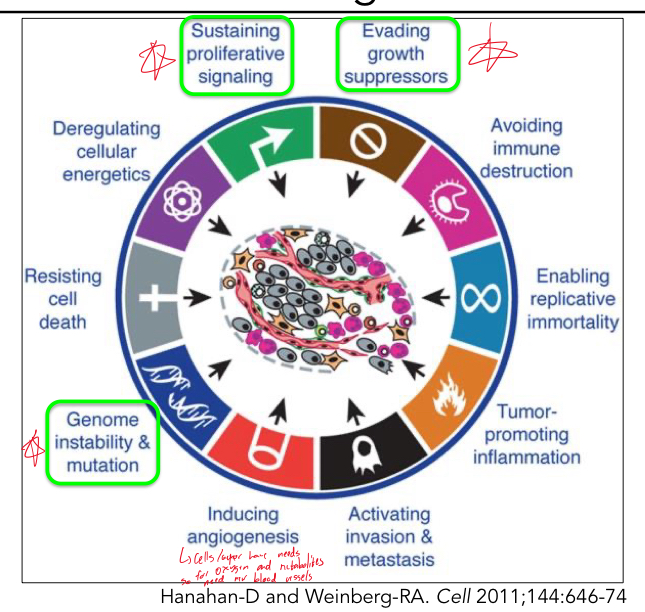
What drives cancer initiation and progression?
Loss of cell growth control
Accumulation of mutations
What can attribute to loss of cell growth control in cancer?
Defects in apoptosis
Accumulation of mutations → cellular transformation
Explain how the accumulation of mutations is a stepwise process
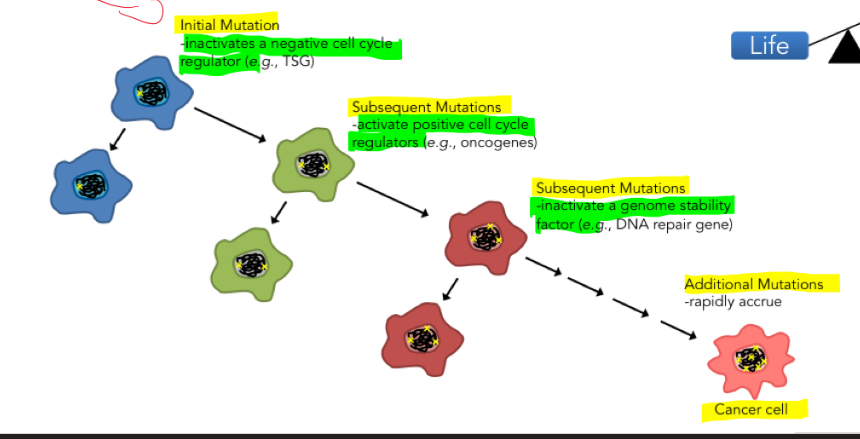
Explain how cancer is a “survival of the fittest” process and explain genetic heterogeneity
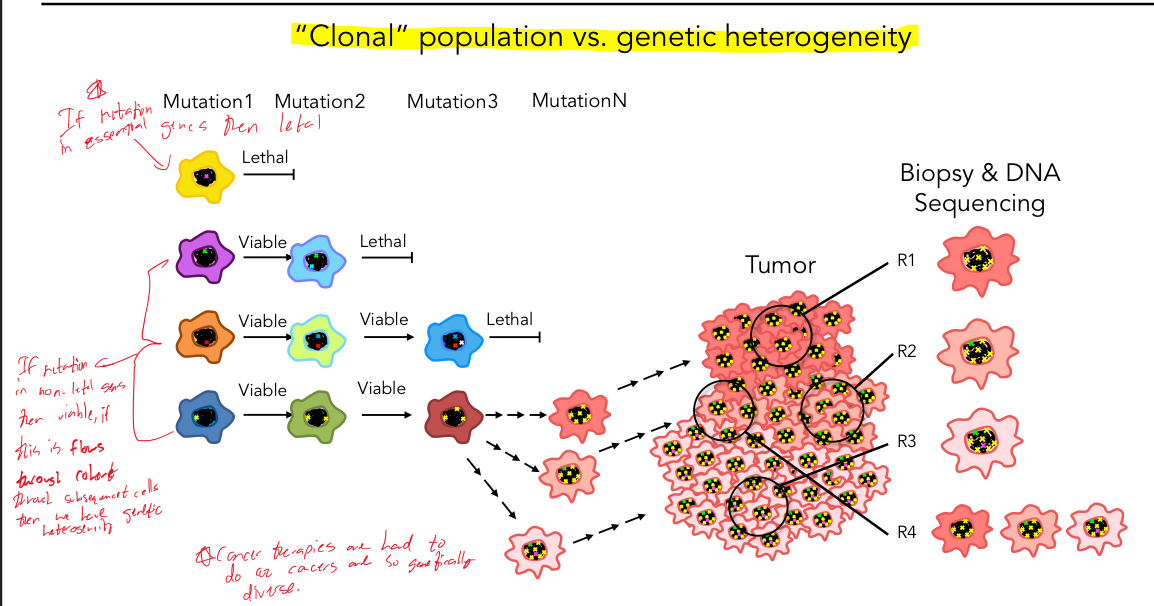
Why are cancer therapies hard to do?
Because cancers are so genetically diverse
Explain Truncal vs branch mutations (cancer tree)
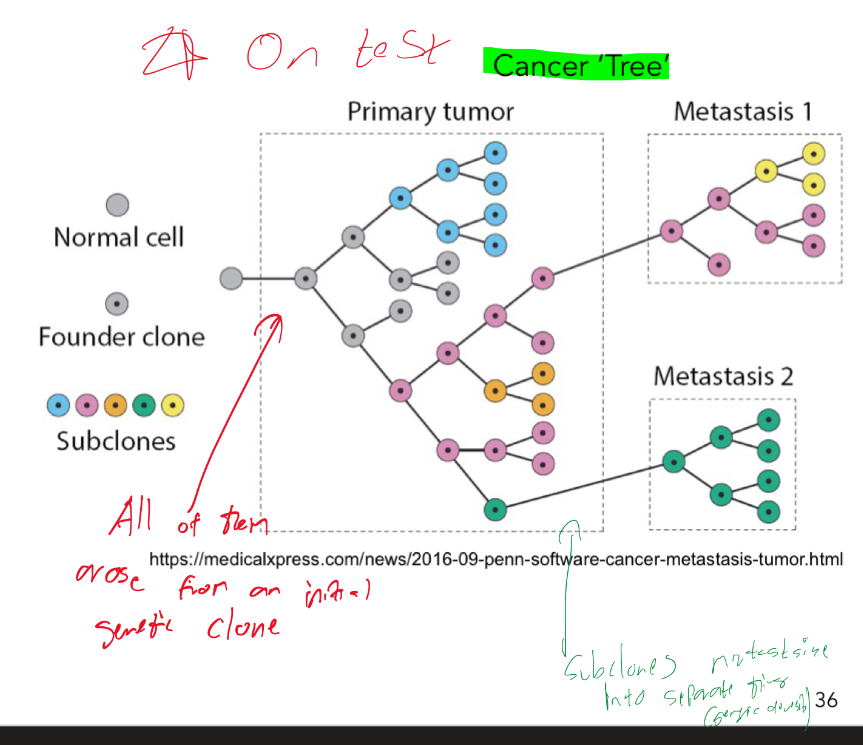
Is cancer a heritable disease?
No, but you can inherit genes that may give you a higher predisposition for it
Explain some heritable cancer syndromes
Familial cancer syndromes (~5-15% of cancers)
Inherited germline mutations
All cells within the body have the same mutation
Inherit a PREDISPOSITION to cause cancer, NOT cancer itself
Do all defective genes cause cancer?
No, they js come with an associated risk to develop cancer
What’re some examples of inherited cancer genes?
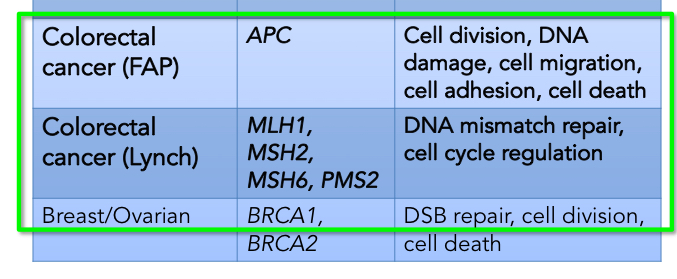
Are colon polyps cancerous
No, dysplasia
What is/ explain Familila Adenomatous polyposis (FAP)?
Heritable cancer predisposition
Autosomal dominant disorder
Individuals have ~100% risk to develop colorectal cancer (CRC)
People with FAP have 100s to 1000s of intestinal polyps in their colon
The deleted gene is in the APC gene (APC mutations)
Adenomatous polyposis coli (tumor suppressor gene)
What is/ why does Lynch syndrome arise?
It’s a familial cancer syndrome
Hereditary Non-Polyposis Colon Cancer or HNPCC
80% lifetime risk to develop CRC
Arises dues to DNA Mismatch Repair (MMR) defect
Genes affected are MSH2, MLH1, MSH6 and PMS2
Causes microsatellite instability
What is MMR?
Evolutionarily conserved DNA repair pathway
Functions to correct errors associated with DNA replication and repair
Often in regions of highly repetitive DNA sequence
Why is MMR important?
Repairs base mismatches
Repairs insertion/ deletion loops which would cause microsatellite instability is unrepaired
What’re the steps of how MMR corrects base mismatches Repairs errors?
Mis-incorporation of nucleotide is recognized by methylation (parental strand methylated, newly synthesized strand isn’t methylated)
Excision of mis-matched nucleotide or unmethylated strand through DNA resynthesis/ repair or DNA methylation
Whats microsatellite DNA?
Class of variable number of tandem repeats
Repeat size is 2-6 nucleotides in length, repeated 3 to 100s of times
Typically in non coding regions
What’re heritable markers/ features of microsatellite DNA?
Stable within an individual
Heterogenous between individuals
Higher mutation rate
Replication slippage (slipped-strand mispairing)
How do test for microsatellite instability?
PCR genes, and we can look at STR regions
Multiple bands in reaction = microsatellite instability
Explain how MMR defects cause lynch syndrome
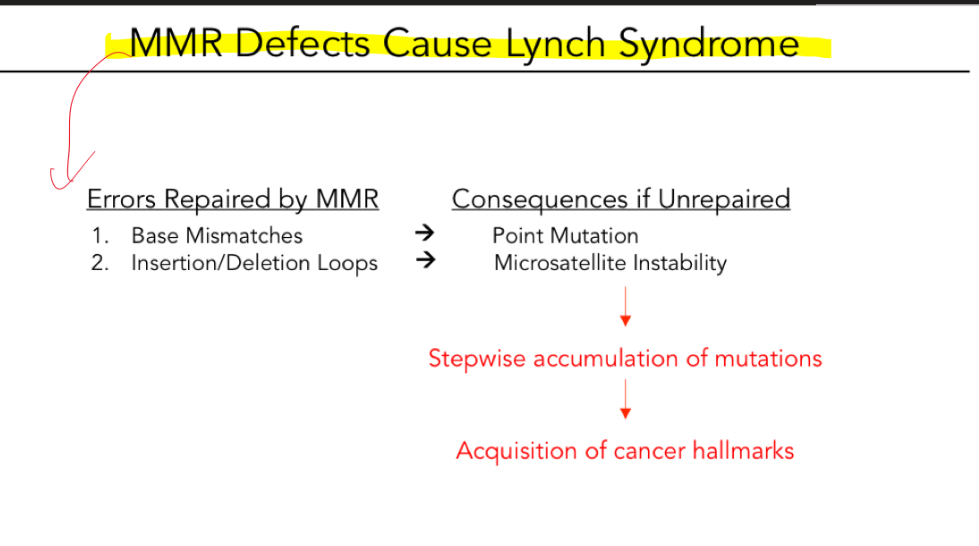
What’re the genetics of lynch syndrome?
Autosomal dominant
Occurrence of 1:1000 births
80% lifetime risk with a mean age of diagnosis 44yrs vs 64 yrs for sporadic
Surveillance can start at 10-12 yrs
Cancers can develop by 19 yrs of age
Germline defect in DNA MMR gene
Aside: ~15% of sporadic CRC have MSI
Increased risk for extra colonic cancers
CAUSES INCREASED RISK FOR OTHER CANCERS
What’re some typical lynch syndrome case studies?
3-2-1 rule
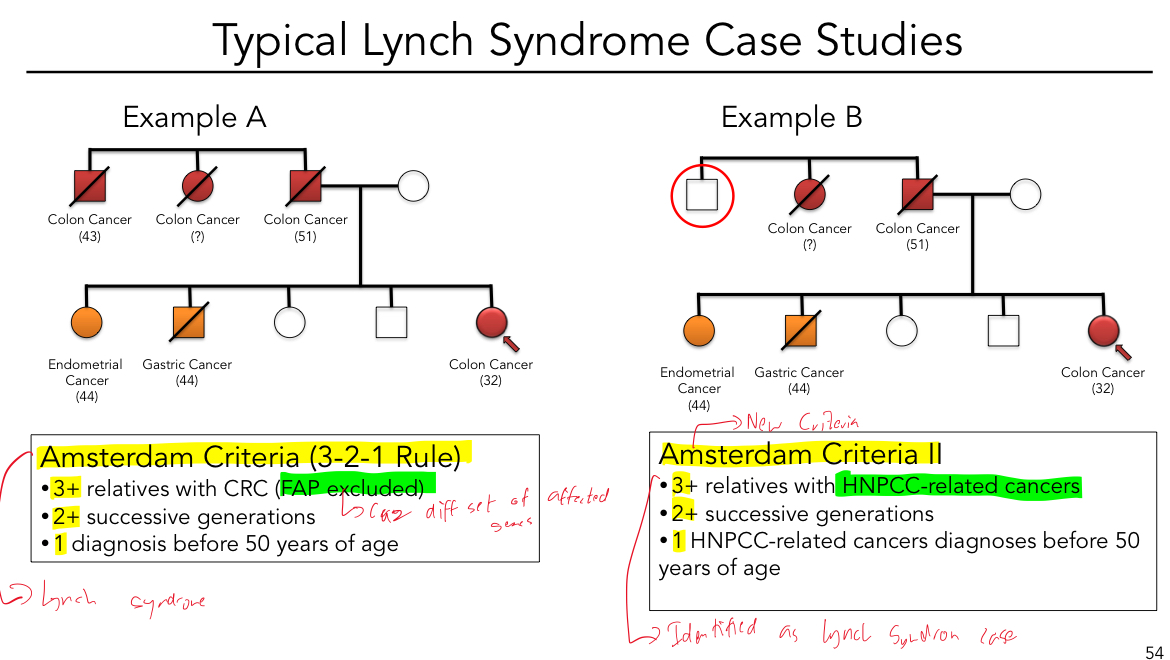
Whats the consequence of dimished repair capacity?
DNA damage > DNA repair
Can lead to early senescence, apoptosis, increased sensitivity to carcinogens or cancer
Accelerated aging diseases (Werners’ or XP) (cancer predispositions)
How many DNA damaging events happen in body?
Total DNA damaging events/ cell/day = ~67000
Total DNA damaging events/cell/hour = ~2750
What’re sporadic cancers?
Randomly arising (de novo)
No known heritable component
Not all cells in body have mutation
Vast majority of cells are sporadic
~85% of CRCs are sporadic
Often takes years to develop cancer
Colorectal cancer 15-20 years
What factors promote sporadic cancer?
Chemical
Radiation
Diet/ food
Viruses/ Bacteria
Environment
How do chemicals cause cancer and give some examples
Chemical carcinogens can lead to DNA damage which includes double stranded breaks
Ex:
Arsenic (pesticides and apple seeds) - lung cancer
Benzene (oil industry) - myelogenous leukemia
Explain why cigarettes/ tobacco smoke cause cancer
Cigarettes have >24 known carcinogens
Up to 50% of cancers are linked to smoking
1 mutation/ 15 cigarettes - for comparison 1 mutation / cell division
What’re 2 types of radiation?
Ionizing radiation
Non ionizing radiation
What’re some important things about ionizing radiation and whats an example?
Proximity, dose and time is most important
Used in cancer radiation therapy
Liberates electron from an atom causing DNA DSBs
Ex: Radon (RN): naturally occurring gas in basements
What’re the different Non-ionizing radiation types?
Electromagnetic radiation
Radio frequency energy (cell phones)
What do the different wavelengths of non-ionizing (UV radiation) do?
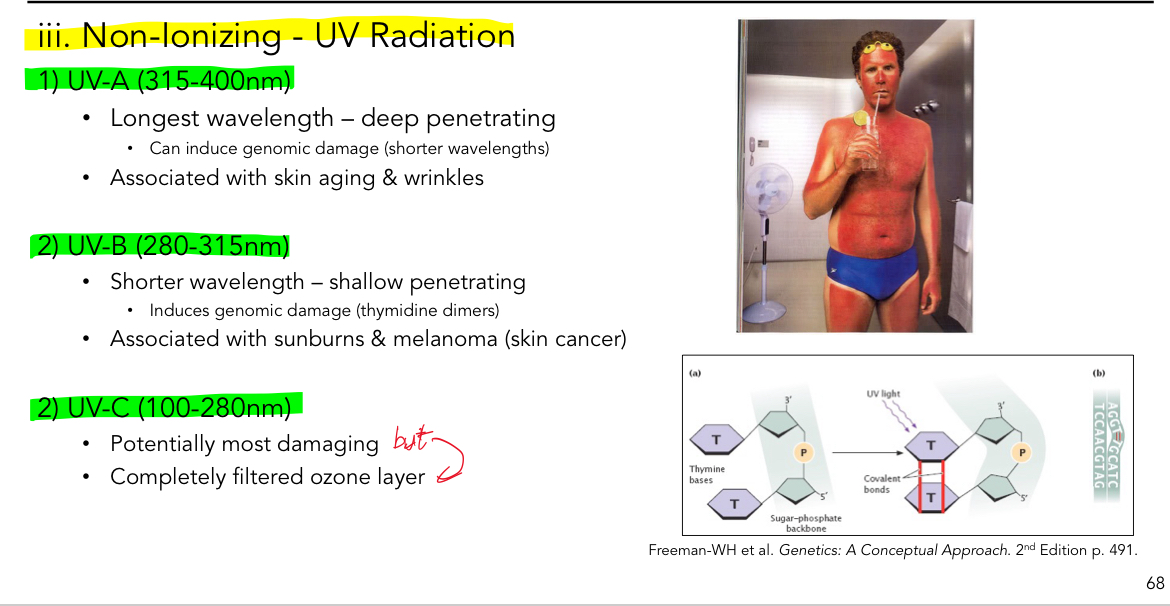
Explain how diet/ food cause cancer
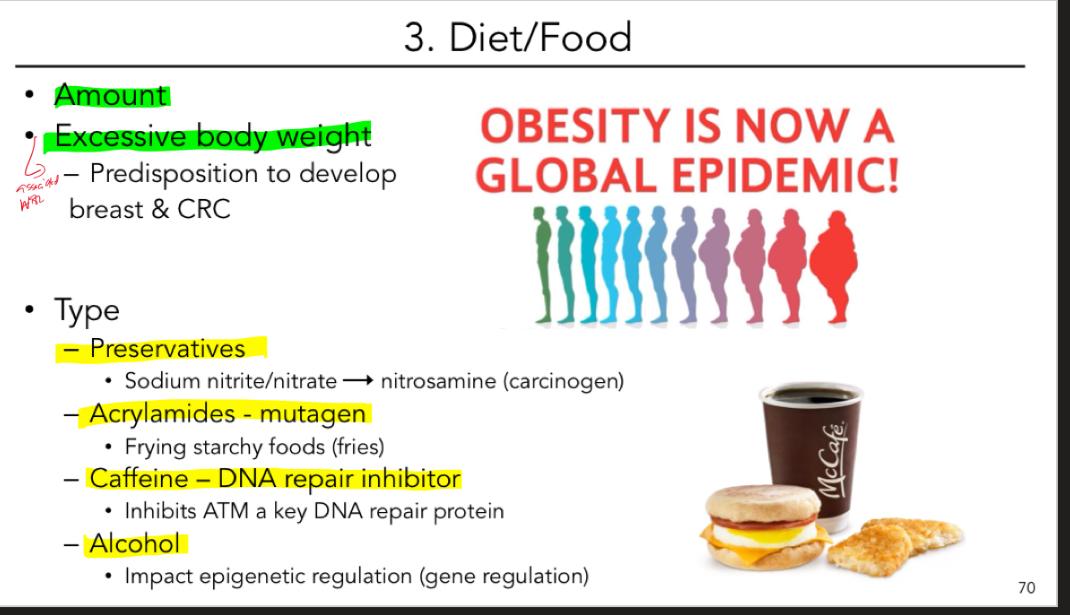
Explain how viruses and bacteria cause cancer
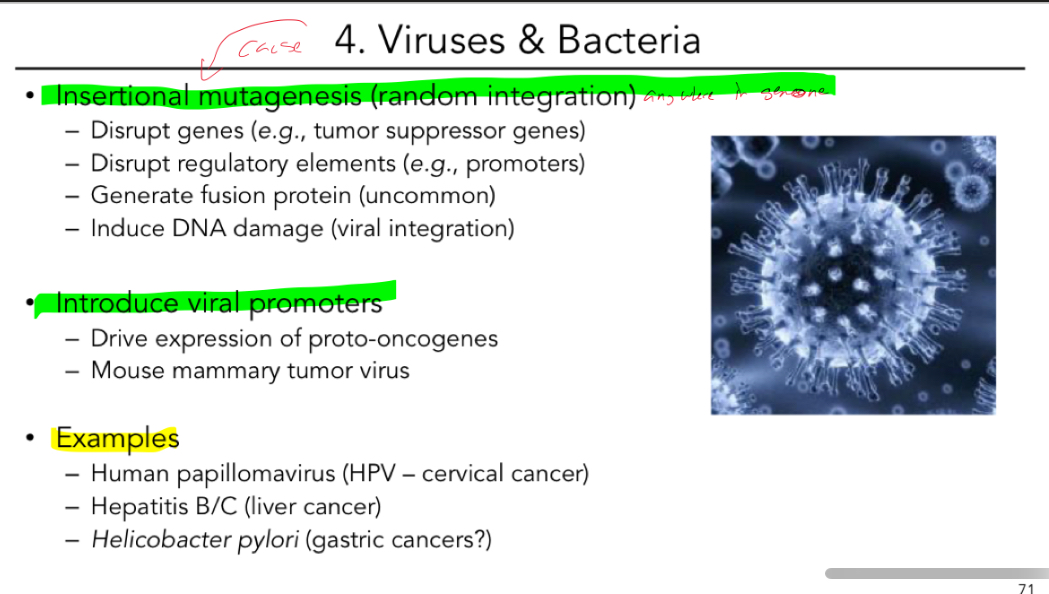
Explain how environment causes cancer
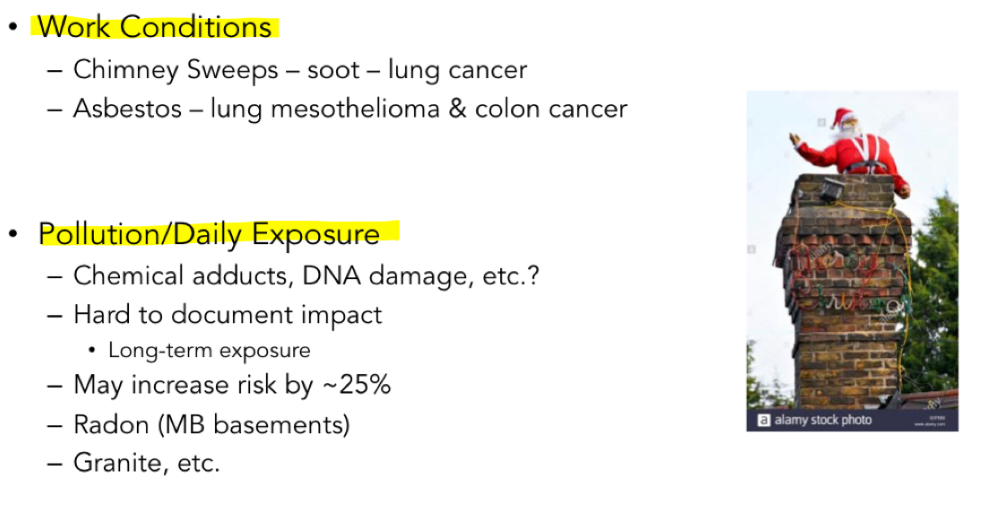
What’re the different types of genetic alterations?
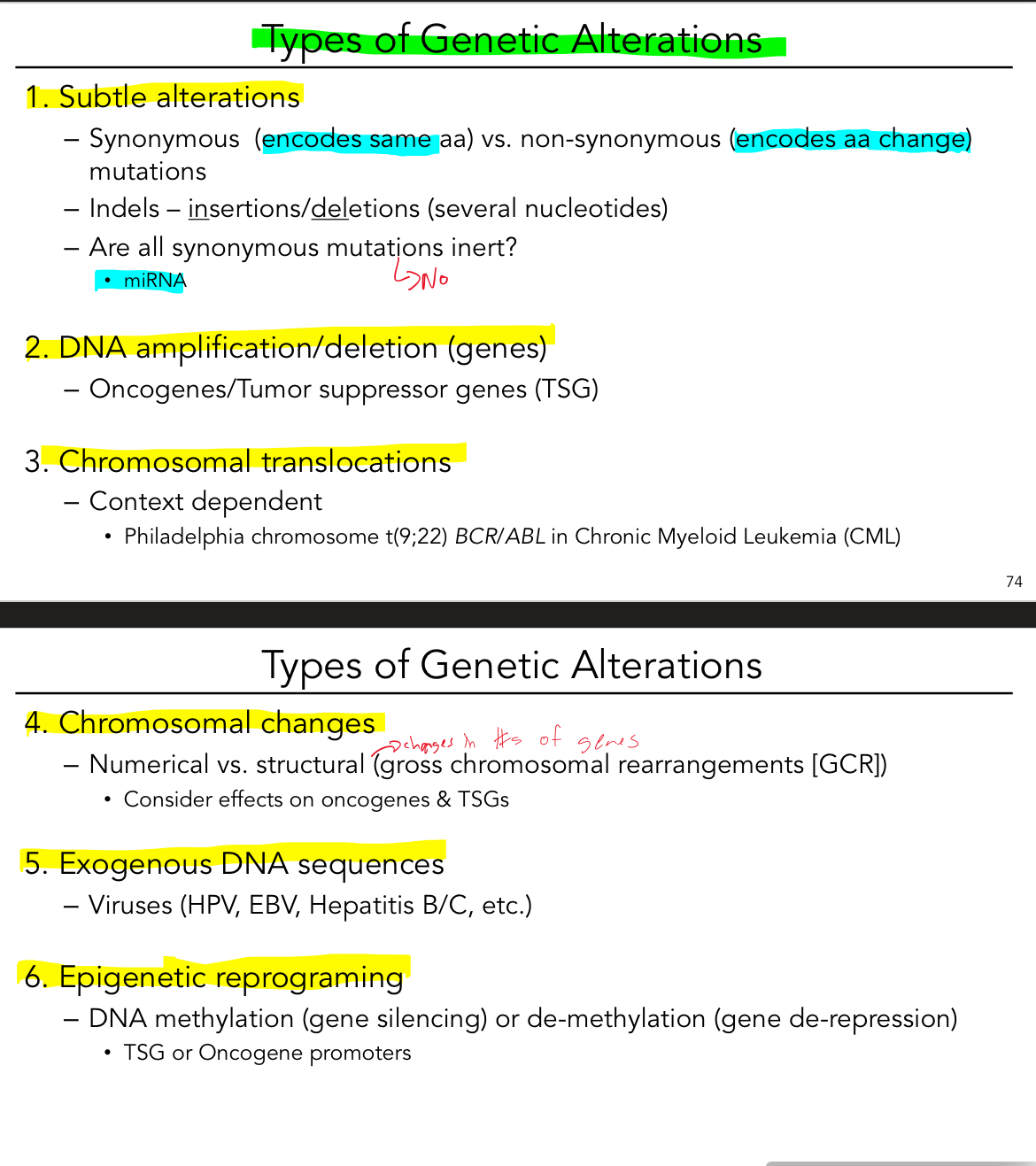
What’re the 3 main genes that causes mutations/ cancer?
